Former ASNC students share their impressions of life after ASNC
Alexia Trensch, graduated in 2011
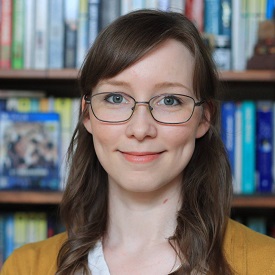
Looking back, it was perhaps inevitable that I should land on ASNC. Like many other ASNCs, I had been interested in history and all things ancient and medieval from an early age; add to this a love of languages discovered at school (I even tried to teach myself Icelandic at some point) and a dash of fate (having later discovered that the earliest written reference to the town I grew up in Germany was in a charter from 704, in which it was granted to bishop Willibrord, the Saxon 'Apostle to the Frisians') and voilá – ASNC was practically tailor-made for me. The combination of language, history and literature in a time period rarely focused on exclusively was both unique and uniquely fascinating, and so I just had to apply.
It turned out to be a very good decision, as I found the department immensely welcoming. When I think back to my time at the department, what stands out most is the community – the pub nights, picnics, lunches, trips. Particularly memorable occasions are getting up far too early (by uni student standards) to catch a train to Birmingham and see the recently-discovered Staffordshire Hoard, and winning a paper-ship full of sweets in an ASNC pub quiz (our team name was 'Odin in the Sky with Ravens', if I recall correctly, which we thought was very clever). And not only the memories, but also the friendships I made in the department have stood the test of time – many of us are still in contact, and we meet up in a group whenever our schedules allow.
After graduating, I went on to complete the MA Translating Popular Culture at City University London – another niche course, focused very specifically on the translation of popular fiction (such as fantasy, science-fiction and crime) and multimodal texts such as comics and audio-visual media. Following this, I started working in localisation quality assurance for video games, gaining valuable hands-on experience in linguistic and related challenges inherent in preparing video games for international release, and eventually started working full-time as a video game translator, first in-house at SEGA and then from 2017 onwards as a freelancer.
In many ways, working as a freelance translator is not unlike studying ASNC. There is puzzling over linguistic issues, of course, and the need to organise your workload across multiple different tasks. But what also feels familiar is the variety of subject matter I find myself dealing with. Much like an undergrad puzzling about the dating of Beowulf one day and then struggling to tell one Olaf from another the next, I could be reading up on fusion power to translate futuristic weapons systems for one project, then weighing up the exact right amount of archaisms to sprinkle into the text for another. One perhaps surprising parallel is the need to extrapolate information from mere scraps of reference, as localisers are frequently given very little or even no documentation on the projects they are working on (a combined side effect of the need for secrecy in the game industry and a lack of understanding of what is required for successful translation). Inferring context and making educated guesses can feel a lot like trying to make sense of contradictory or incomplete historical evidence, and the analytical and research skills gained through ASNC certainly help in dealing with such challenges. |
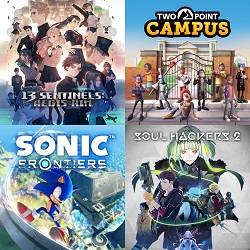 |
| Finally, when translating creative texts such as novels or in my case, video games, it’s important to be able to write in a wide variety of styles and linguistic registers as required by the tone and context of different projects. While I have yet to work on a game where I could directly apply any residual knowledge retained from my uni days, delving into the inner working of various languages, including earlier forms of the languages I now work in (English and German), and exploring the writings of the people that spoke them, unquestionably broadens the mind and increases linguistic dexterity and understanding – both invaluable for a translator. | 13 Sentinels: Aegis Rim ©SEGA, Two Point Campus ©SEGA, Sonic Frontiers ©SEGA, Soul Hackers 2 ©ATLUS ©SEGA |
Pierre Novellie, graduated in 2012
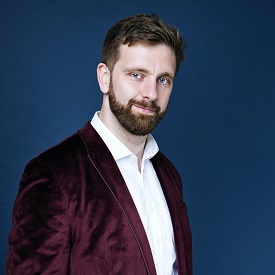
I chose to study ASNC having discovered its existence by flicking through a prospectus. I was always a huge history nerd but I was dismayed at the idea of going to university and once again slogging through the causes of the First and Second World Wars, rise of Communism, Fascism, Cold War and all the other topics I had been memorising over and over through GCSEs and sixth form. ASNC was many things to me: a chance to learn about the history of the United Kingdom and Ireland that I was never taught, as well as northern Europe generally, a chance to keep up with studying languages, archaeology, literature and more. It was also a chance to contextualise my own formative years growing up in the Isle of Man (a truly ‘Norse and Celtic’ place) having moved there from South Africa. The field is also constantly changing and evolving – you could actually be the first person to discover, theorise or explain something completely, truly new! Very few areas of study can offer that thrill.
I found the department to be an incredibly supportive, warm community, a small place of intense study and a reservoir of eccentricity. Studying ASNC stretched my mind marvellously and I have used the intellectual tools from my degree constantly. Personally, I also made some lifelong friends from the department and am delighted to still be in touch with my Director of Studies.
During my studies I fell in with a bad crowd (Footlights) and did a great deal of comedy when I wasn’t ASNC-ing. I was part of the Footlights Tour Show in 2012 along with fellow ASNC George Fouracres, now an actor, and in 2013 moved to London to try to become a professional stand-up comedian. Since that challenging move to London, I have managed to become a full-time stand up, performing for hundreds or thousands of people at a time all over the world. I am also a professional writer, podcaster and radio show co-host, as well as managing a few television appearances here and there.
It might sound odd but, particularly with writing satire, the ASNC skills of dealing with source material and using one’s imagination to look at facts from every possible angle have been invaluable. I have even written and performed a few routines on ASNC topics (early medieval Welsh law, the Christianisation of Scandinavia) which go down particularly well in Wales and Scandinavia. The art history aspect of the degree has also played into much of the drawing and painting I do on the side.
In a broader ‘life skills’ sense, the degree has made me a smarter, more capable person. The linguistic and archaeological side have, even for merely adequate student like myself, given me a basis for understanding and explaining a great many other things in life. You never know what might become relevant in your lifetime. For example, you’d be surprised how often ASNC topics are manipulated to shore up, say, political propaganda. It is a great gift to be able to see through it thanks to my studies in a way that modern history graduates cannot.
If, like me, you are someone with no previous ASNC experience aside from casual reading I can tell you that the degree with stretch you. However, I can promise you that the Department will help you enormously and you will be all the more enriched for that stretching – study something interesting, why don’t you!
Carly Hilts, graduated in 2009
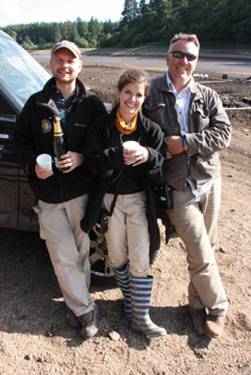
On location on Dartmoor with James Adcock (Geophysics) and Kerry Ely (Site Co-ordinator), taking a break from excavating a Prehistoric stone circle to celebrate filming Time Team's 200th episode.
I actually discovered ASNC completely by accident, turning over too many pages in the Cambridge prospectus while looking for Arch and Anth. History, language and literature have always fascinated me and the opportunity to combine all my favourite studies was very tempting; the interdisciplinary nature of the course is one of its greatest strengths and most enjoyable features. Add to this a childhood love of Norse mythology and ASNC seemed an obvious choice.
Arriving from a state school that didn't send many people to Cambridge I was unsure what to expect but I was amazed by how friendly and welcoming the ASNC department is; its size makes it very sociable. Many of the lecturers dropped in on 'ASNC Pub' every Friday and because one or two ASNaCs can be found in every college, hall-swaps were easily (and frequently) organised. Being part of such a small subject leads to a real sense of community – in ASNC you're quickly on first-name terms with the whole department, staff included.
After completing the undergraduate degree, and then the ASNC M. Phil., I had a brief spell as a journalist, working for a press agency covering eight counties for all the national papers. ASNC trains you to be resourceful, draw together disparate (and often contradictory) sources and think outside the box – invaluable skills for a reporter! However, my career path took a swift change of direction when I was offered a research job with the Channel 4 archaeology programme Time Team.
Working for the Team was hard work but enormous fun – being back amongst quirky individuals who were passionate about history felt like coming home. It was my job to help find sites, put together detailed research folders, visit archives to gather interesting historic maps, documents and images to show on screen and sort out the copyright for these. During filming I briefed contributors before history scenes and sat in to fact-check, gave guided tours of site to local officials, press and school groups and answered any factual questions the director might have. Highlights included learning to drive the huge 4x4s off-road and dressing up as a Roman for a reconstruction scene.
Since the series ended I have worked as a freelance history researcher, both in TV and educational media. I spent three months putting together research packs on Ancient Egypt, China, Greece and Rome for a company that makes online history videos for schools in 12 countries and I've also worked for the children's TV show Horrible Histories. Although I'm often researching historical periods outside those I studied at Cambridge I am always using the skills I developed as an ASNaC. Without the ability quickly to teach myself a subject from scratch, deal imaginatively with a range of source material and use my initiative when faced with something I don't know, I wouldn't be able to do my job.
I'm currently helping to create an educational computer game about Ancient Egypt for schools. On any given day I can be researching Ancient Egyptian hunting rituals, creating a map of the Valley of the Kings, making fact-files that will pop up when a student clicks on an artefact or writing dialogue for an animated Howard Carter. My biggest task has been helping design buildings that will be turned into 3D models for players to explore; reading excavation reports to make sure the layout, decoration and furnishings are absolutely accurate. It's quite easy to say 'put this artefact here' for a well-documented site like Tutankhamun's tomb, but reconstructing how to decorate the walls and floor of Akhenaten's palace – which hasn't stood for over 3000 years – is more of a creative challenge!
Freelancing is hard work and looking for a new job every few months can be stressful but it's exciting to be always moving onto a new project before you have time to get bored. ASNC equipped me with all the skills I need in my line of work and having such a niche specialisation is very handy for making my CV stand out in a competitive field! I feel very lucky to have received my training in such a diverse, lively and above all, fun department.
Rob Douglas, graduated in 1971

I arrived at Churchill College in 1967 and studied History for Part I of the Tripos. Although I enjoyed it, I wanted a change for Part II. I had enjoyed the early mediaeval parts of the History curriculum and was therefore attracted to Anglo-Saxon and Old Norse, subjects which at that time you could only study for one part of the Tripos. The College accepted that I should take two years over the Tripos and I added to that a long vac term. I thoroughly enjoyed the two years, and the small size of the faculty had many attractions.
I graduated in 1971 with a 2:1 with little idea of what career to follow. Initially, on the suggestion of the Careers Service, I took a postgraduate course in Archives Administration and worked for a couple of years as an Archivist.
After three years, however, I decided that I needed to try my hand at something else and took the Civil Service exams. I was successful and found myself, to my surprise, in the Inland Revenue being trained as an HM Inspector of Taxes. Also to my surprise, I came across one of the other two undergraduates from my ASNC studies! I completed the training successfully, working during that training and as a fully trained Inspector in the inner London suburbs – Walworth, Brixton and Bermondsey. I followed many other colleagues into the private sector, in my case, Royal Dutch Shell where I spent ten years working in the tax department, initially in Head Office, then as Head of Tax in Shell UK before ending up as Head of International Taxation based in the Hague. I was then offered the chance to move into general management and held a series of fascinating senior roles – oversight of Shell’s operation in East Asia, Chief Executive in Belgium, Chief Executive in Italy, and Vice President for Mergers and Acquisitions and Competitive Intelligence for the Global Exploration and Production Business. I left Shell of my own choice at the end of 1999 and since then have built a portfolio of activities, built around my own consultancy activities, and a series of non-executive roles in the public and private sector. I chaired the Surrey Learning and Skills Council and was Deputy Chairman of the South East England Development Agency. I even chaired a small oil company, Iceni Oil and Gas. I am now on the Board of the Higher Education Funding Council for England, A governor of CILT, the National Centre for Languages, and on an advisory Board at the Department of Business and Enterprise. In 2005 I was made a CBE and I am currently a High Sheriff in Nomination for Surrey 2010/11.
I feel I have had, and am still having, a very varied and interesting career. I am often asked about my degree in ASNC and I always say that it was an excellent preparation for what followed. Why? At one level, there is the curiosity value – at most job interviews, most introductions at conferences etc, my degree is a topic of conversation. It still means that one stands out. The content occasionally comes into its own as well – when negotiating in China I found that Old Norse proverbs could be utilised to great advantage with a people who love proverbs – “The path to the door of one’s friend is short however long the journey” went down well after flying to Beijing for a single two hour meeting! And I am delighted to have the chance to become a High Sheriff, a role introduced by the Anglo-Saxon kings. But most importantly my degree studies taught me the ability to integrate separate strands of information into a single picture or story line. For me Anglo-Saxon and Old Norse was the study of a part of North West Europe between 400 and 1200 and only by weaving together the archaeology, the language, the literature and the history could you get anything like a coherent overview. The skill I developed in doing that proved invaluable in all my subsequent roles, all of which, from Tax Inspector to Country Chief Executive to Public Sector non-executive needed and still need the ability to weld together disparate information to give a single picture.
Miles Harris, graduated in 2000
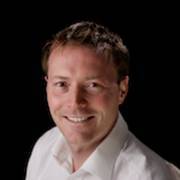
The main reason I chose Anglo-Saxon, Norse, and Celtic was my interest in the period. However, I was also reluctant to give up historical, literary or linguistic studies; I hoped the course would provide an opportunity to further my skills and knowledge in all these areas and I was not disappointed. I thoroughly enjoyed my study at Cambridge and have benefited a great deal from my degree.
The skills I learnt from the course have equipped me well for my life since leaving Cambridge. As many others have noted, taking a degree in ASNC is always a useful point of conversation in my job interviews. It marks you out from the crowd of applicants and protects you against embarrassing questions about your degree; it is one thing you can be confident interviewers know less about than you!
In 2000-2001, I taught history at an independent school in England and whilst the Venerable Bede was a surprising omission from the GCSE and A-level Syllabi, I had the necessary grounding to assimilate and be able to teach new periods with confidence.
Having left teaching, I am now a barrister at 4 New Square chambers in Lincoln’s Inn, London, which is a leading set of barristers specialising in commercial and professional negligence law. While I think the skills you develop during an ASNC degree can be applied in virtually any line of work that involves significant use of your intellect, I have found them particularly important in this career.
Leaving aside knowledge of the law, the day-to-day work of a barrister requires me to piece together the factual story of different cases from the documents, question the reliability of source material, absorb information, sift the relevant from the irrelevant, analyse language and the meaning of words, carry out research and marshal my thoughts and opinions in a concise, accurate and compelling way both orally and on paper. ASNC helped me develop all these skills. What’s more it helped me to do so while I spent 3 years immersed in, and learning about, the fascinating cultures and histories of the Anglo-Saxon, Norse, and Celtic peoples rather than stuck in the dry world of case law, statute and (worst of all) European regulations. All this and the privilege of living in Cambridge, one of England’s most beautiful cities.
Few of my Cambridge contemporaries speak as highly of their subject, lecturers or directors of studies as my friends from ASNC and that is a powerful testimony to the quality of the Department and the satisfaction and enjoyment that can be taken from a unique degree.
Rachel Beckett, graduated in 1989
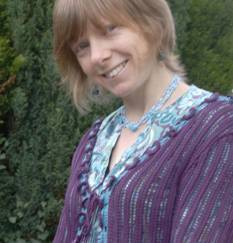
I relished my time in ASNC, a unique community of delightfully eccentric linguists and historians, and the wittiest department in Cambridge. When I went to see Footlights, I found them very disappointing compared with Gesta Asnacorum (the magazine of the ASNC society)! Much as I loved languages, I had to move on, as in those days ASNC was not a full Tripos subject. I took up the baton of Insular Art and (reluctantly) ran with it to the History of Art department.
Building on my studies, I later worked as an editor on a number of non-fiction publications, 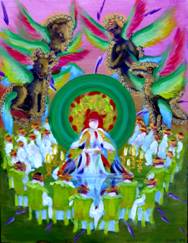 including the Macmillan Dictionary of Art. As an editor you often find that "less is more", and my greatest reductive feat was to cut a 9000 word article on Spanish Romanesque metalwork down to the 900 words required by our editor! I later commissioned and edited the arts volume of an encyclopedia for Larousse and wrote a volume on Medieval Art as part of a set of children's encyclopedias for Brown. While my son and daughter were small, I returned to studying, and gained an MA in printmaking and illustration, for which (among other things) I produced a colour wood engraving of The Dream of the Rood.
including the Macmillan Dictionary of Art. As an editor you often find that "less is more", and my greatest reductive feat was to cut a 9000 word article on Spanish Romanesque metalwork down to the 900 words required by our editor! I later commissioned and edited the arts volume of an encyclopedia for Larousse and wrote a volume on Medieval Art as part of a set of children's encyclopedias for Brown. While my son and daughter were small, I returned to studying, and gained an MA in printmaking and illustration, for which (among other things) I produced a colour wood engraving of The Dream of the Rood.
My interest in Insular Art has continued to inform my painting, as in my recent series of 22 illustrations for the book of Revelation produced in 2008 (see illustration).
One only goes into publishing for the sheer love of it, as it makes nursing and teaching look well-paid. This is just one reason why I am now retraining as a secondary school maths teacher. Maths has often featured in my artistic work, as well as in my MA dissertation, and I may find links between maths and ASNC to spice up my lessons. Starting with the Celtic knots, who knows where my imagination may take me next?
Alaric Hall, graduated in 2000
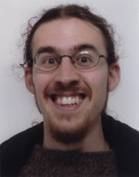
Hey ho! I did ASNC from 1997–2000, and originally wrote this entry in 2001--but I've brought the story up to 2008 at the end.
I never did find a good answer for why I wanted to do ASNC (and admitted it in my interview). Looking back, I think it's something to do with the fun you can have not having much evidence (you reach the boundaries of knowledge quicker) and the way ASNC, having got you to the boundaries of knowledge, then helps you to push them back for yourself. It teaches you to handle primary sources in the original languages, that kind of thing. And there was the pleasant combination of the exotic and familiar that comes from studying the early history of the culture I grew up in.
Like a lot of ASNCs, I came from a state school and I was impressed even before I applied with how well the teaching and community in the ASNC department gets to be a leveller in terms of ethnicity/class/age. The department’s very welcoming, and the variety of students you meet makes it an interesting department to be in.
The community life which the department generates is really special. Most students’ social life in Cambridge is based on their college--which is great. But arts students especially tend not to get to meet folks from other colleges who do their subject, and can get a bit tired of that after a couple of years. Likewise, they often don't get to know many of their staff at a personal level. ASNCs are again a bit special that way: the ASNC Society provides a great community for the students and staff. ASNC students go to the pub together, organise field trips for themselves, that sort of thing--it's a great community.
After I graduated from ASNC I did a master’s degree and a Ph.D. at Glasgow, worked as a researcher for a couple of years at Helsinki, and in 2007 became a lecturer in medieval English literature at Leeds. Check out www.alarichall.org.uk for further information…

